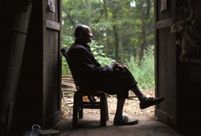 Famous Lanzhou beef noodles
Famous Lanzhou beef noodles Armed Police hold anti-terrorism drill in SE China's Xiamen
Armed Police hold anti-terrorism drill in SE China's Xiamen Harbin Int'l Ice and Snow Festival opens
Harbin Int'l Ice and Snow Festival opens 'Jin' named the word of the year by cross-strait netizens
'Jin' named the word of the year by cross-strait netizens Chinese scientific expedition goes to build new Antarctica station
Chinese scientific expedition goes to build new Antarctica station
 Chinese naval escort fleet conducts replenishment in Indian Ocean
Chinese naval escort fleet conducts replenishment in Indian Ocean 17th joint patrol of Mekong River to start
17th joint patrol of Mekong River to start China's moon rover, lander photograph each other
China's moon rover, lander photograph each otherGUANGZHOU, Jan. 8 -- The debate on whether to help those in need has reignited among Chinese after the suicide of a man who faced accusations and demands for compensation from an injured senior citizen.
Wu Weiqing, a 45-year-old villager in Dongyuan County, Guangdong Province, committed suicide by drowning himself in a pond near his village on Jan. 2.
Prior to his suicide, he told his daughter, Wu Haiyan, he had been demanded to pay 200,000 yuan (32,700 U.S. dollars) in compensation following a road accident.
On Dec. 31, 79-year-old Zhou Huoqian fell down on a rural concrete road as Wu passed him on a motorbike. Zhou insisted that Wu's motorbike hit him, but Wu denied it and the two argued.
Zhou Yuqin, a local resident near the road, said he came over to help the senior, but failed. He then asked Wu to first send the senior citizen to the village's clinic. Wu agreed and carried Zhou on his back to the clinic.
Wu told the investigating police that his motorcycle did not hit Zhou and he just took him to the hospital as a good deed. Zhou Yuqin, the resident, said he did not witness Wu's motorbike hit the man as he came over after the accident.
Wu paid nearly 4,000 yuan in medical fees for Zhou, but he faced paying more compensation as Zhou is still undergoing hospital treatment. Wu was a garbage collector in the village and only had a monthly salary of 700 yuan.
Zhou Rihua, son of the hospitalized elder, said he called Wu on Jan. 2 but did not ask for money. Traffic police also denied they ever demanded Wu pay 200,000 yuan.
Wu was a good man in the eyes of villagers and did many good deeds in the village. In his last phone call to his friend Lan Xiaodong, Wu urged him not to do good deeds anymore.
Police are still investigating the case, but they said Tuesday that an initial probe found no evidence of contact between the motorbike and the senior.
Wu's death reignited a debate on whether to do good deeds for fear of accusations and demand for compensation.
"If aiding others brings such results, who dares to help?" asked a villager.
"I will help others, which means I do a good deed. To accuse helpers would be a sin. We cannot stop doing good deeds just because of some bad people," wrote a netizen on Sino Weibo, a Twitter-like service popular in China.
Several similar cases in recent years have prompted Chinese people to rethink the traditional virtue of helping elders.
In one of the cases, an elderly woman fell down in Dazhou City, Sichuan Province last June, but later blamed three children who helped her for causing the accident and demanded compensation. After investigating the case, police concluded that the 74-year-old woman had fallen on her own and the act constituted extortion.
In a move to deal with such cases, Shenzhen City, Guangdong Province, promulgated a law in October to protect the interests of Good Samaritans. It stipulated that people who were helped by others and sought compensation from those who helped would face unfavorable consequences unless they have hard evidence to prove the cause of their physical harm.
"Wu's suicide may be just an extreme case, but the debate on social morality it has triggered is more heart-rending," said Yang Nailiang, a professor of humanities and law at South China Agricultural University.
Legislation could solve some problems, but cannot tackle the fundamental problem in a society with the flighty and impatient minds of many citizens and a lack of trust between people, he said.
"It needs a systematic project to pass down the traditional good virtues which have existed for several thousand years," he said. "There is a long way to go to restore the missing public order and good customs."
 Chinese Consulate General in S.F. burned for arson attack
Chinese Consulate General in S.F. burned for arson attack Roar of J-15 fighter is melody for operator on the Liaoning
Roar of J-15 fighter is melody for operator on the Liaoning A 90-year-old forester's four decades
A 90-year-old forester's four decades Most touching moments in 2013
Most touching moments in 2013 2013: Joys and sorrows of world politicians
2013: Joys and sorrows of world politicians Missile destroyer Zhengzhou commissioned to Chinese navy
Missile destroyer Zhengzhou commissioned to Chinese navy China is technically ready to explore Mars
China is technically ready to explore Mars Photo story: Life changed by mobile technology
Photo story: Life changed by mobile technology Bullet train attendants' Christmas Eve
Bullet train attendants' Christmas Eve Heart-warming Laba porridge
Heart-warming Laba porridge Gallery: China's trapped icebreaker makes successful escape
Gallery: China's trapped icebreaker makes successful escape Photo story: We are special soldiers
Photo story: We are special soldiers 'Rong' selected HK's character of the year for 2014
'Rong' selected HK's character of the year for 2014 Famous Lanzhou beef noodles
Famous Lanzhou beef noodles Chinese Consulate Arson Suspect Makes 1st Court Appearance
Chinese Consulate Arson Suspect Makes 1st Court AppearanceDay|Week|Month